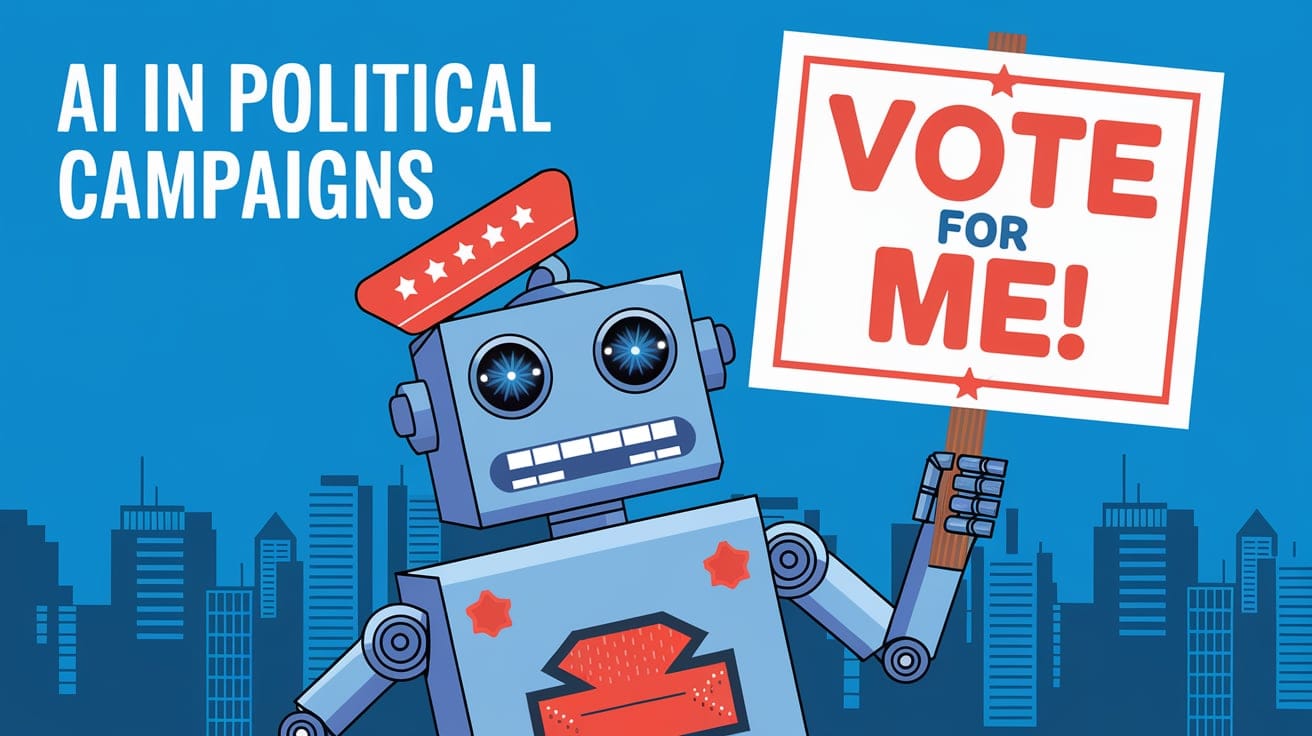

Are you ready to disrupt with AI? Join our Hackathon today! Click to Register
By WebOsmotic Team | Published on March 11, 2025
Summarize Article

Table of Contents
ToggleArtificial Intelligence (AI) is revolutionizing every sector, and politics is not far behind. AI in Political Campaigns is revolutionizing the way candidates interact with voters, gauge public opinion, and fine-tune campaign strategies. As technology evolves, it is apparent that AI and political campaigns will keep changing, presenting opportunities and challenges alike.
| AI Application | Future Impact |
|---|---|
| AI-Powered Debates | Real-time analysis of candidate statements and fact-checking during live debates. |
| Holographic Campaigning | AI-generated holograms of candidates speaking at multiple locations simultaneously. |
| Blockchain for Voting Security | AI-backed blockchain technology to ensure transparent and tamper-proof voting. |
| Advanced Deepfake Detection | AI tools to combat misinformation and identify manipulated videos. |
| 24/7 AI Chatbots | Fully autonomous virtual assistants handling voter queries round-the-clock. |
Picture a day when political campaigns depended on in-person rallies, print ads, and door-to-door canvassing. Fast forward to the present, and AI is transforming the way candidates engage their audiences. In 2012, former President Barack Obama’s campaign team made use of data analytics to micro-target voters. By 2016 and 2020, AI chatbots and sentiment analysis became a staple of campaign tactics.
AI-powered tools currently assist politicians in creating tailored messages, forecasting the behavior of voters, and optimizing ad budgets. The future of elections will be even more advanced with AI-based applications, enabling campaigns to be smarter and more data-centric than ever.
Following are some of the most important ways AI in Political Campaigns is being utilized these days:
AI was an integral part of campaign strategies during the 2020 U.S. Presidential Election.
Candidate: Joe Biden vs. Donald Trump
AI Utilization:
Outcome: Both campaigns used AI to maximize reach, demonstrating that future elections will increasingly depend on AI-based strategies to gain voter support.
1. Improves political campaigns:- AI increases voter interaction, facilitates data-driven decision-making, and tailors campaign approaches, making outreach more efficient.
2. Risks of using AI in elections: The dangers are misinformation, data privacy issues, and the possibility of AI-created deepfakes disseminating false information.
3. Predicts election results:- While AI can scan past data and voter opinion, elections are dynamic, and there are external influences that can alter final results.
4. Ethical AI usage:- Transparency, regulatory norms, and AI governance frameworks assist in upholding ethical standards for political campaigns.
5. Future of AI in elections:- AI will continue to advance, with real-time voter sentiment monitoring, AI-driven debate analysis, and automated canvassing systems.
At WebOsmotic, we offer premier AI solutions customized for political campaigns. If you require AI-based voter analytics, sentiment analysis, or chatbot engagement, we have you covered!
Get ahead of the competition with AI-driven political strategies. Reach out to WebOsmotic today and transform your campaign!
The convergence of AI and election campaigns is transforming the democratic process, injecting efficiency and innovation. While there are enormous opportunities, ethical factors should always be a top priority. AI will power the future of elections, but human intervention will always be a prerequisite in keeping it fair and transparent.
No, AI is a tool that amplifies strategies but cannot substitute human instinct and personal relationships in politics.
Though AI can manipulate voter attitudes, ethical guidelines and regulations are required to avoid abuse.
Yes, if utilized ethically, AI can enhance transparency through data-driven insights and minimize misinformation.
Policies and legislation are being formulated to guarantee the responsible use of AI in elections, with an emphasis on transparency and fairness.
AI identifies and marks fake news, enabling voters to access verified and factual information during elections.
Unlock exclusive insights and expert knowledge delivered straight to your inbox